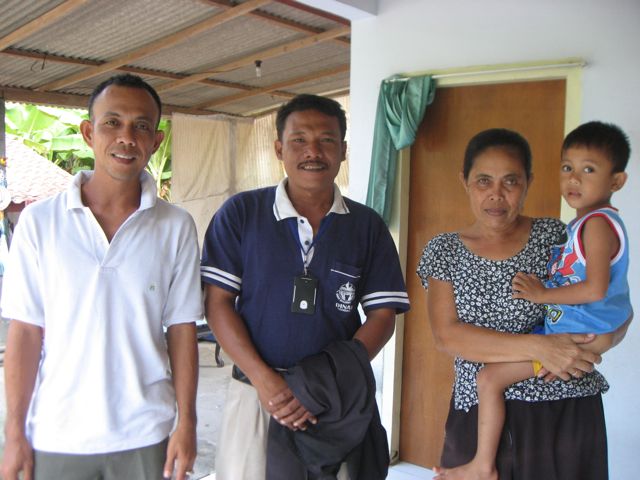Microfinance and the economic casualties of terrorism
July 21, 2009
by Zev Lowe, KF 8 Indonesia
Last Friday, suicide bombers attacked two major hotels in Jakarta — the Ritz Carlton and the Marriott. The group probably responsible for the two Bali bombings – the first in 2002 and the second in 2005 – is suspected to have carried out this recent attack in Jakarta. Bali is about 600 miles and several bodies of water away from Jakarta, so we didn’t feel the physical impact of the blasts. But the terrorist attacks in Jakarta brought back painful memories here in Bali.
The first time the Bali bombings came up in conversation for me, it was when I was interviewing a borrower, Pak (Mr.) I Putu Agus Sumerta. Pak Herman, a DINARI loan officer, introduced Agus to me as a victim of the 2nd Bali bombing.
I immediately assumed that he had been injured in the blast, but it turned out he was working in a hotel in the capital city of Denpasar at the time, nowhere near the beaches of Kuta and Jimbaran where the bombs went off. When I expressed my confusion, Agus and Herman explained that for most people in Bali, the most lasting negative consequence of the bombings was economic. Tourists were driven off the island and even regular visitors didn’t come back for years. Agus’ hotel was forced to close, and he was forced to return to his village of Melaya.

Pak Agus, Pak Herman, Pak Agus' mother and young son
Over the next few weeks, I heard many similar stories. Pak Zeruya, DINARI’s Kiva Coordinator, also used to work in a hotel and restaurant, but the bombing drove him back to his village. He described a massive influx of young people losing their tourism-related jobs and going back to their villages, which didn’t have enough nearly enough work to support them and their families.
DINARI and Kiva played an important role for many of these people, giving them the capital to start their own businesses. Tailoring is a profession that has been in Agus’ family for generations, handed down from parent to child. He had learned to sew as a young boy. He found out that he could get a loan through DINARI from his mother, who had previously been part of a group of women who borrowed funds to raise and sell pigs. That was all the impetus he needed, and soon he had set up shop with an old sewing machine, and started taking orders from neighbours and friends who needed new uniforms for work and clothes to wear for Balinese Hindu ceremonies.
Pak Agus is still a DINARI client. He dreams of having a bigger shop, and he is working nights as a bartender to save up towards that dream. If at some point he needs still more capital, he can borrow more money once he’s paid off his current loan.
But that’s not how most disaster relief aid works. DINARI recently received a visit from a non-profit that did a ton of good work right after the 2004 Indian Ocean tsunami, going into areas that had been badly affected by the tsunami and building schools to help children get a better education. I was amazed at all that they had accomplished and moved by their dedication. But how many people do you know who are still donating money to tsunami victims today?
Now, the funds available to maintain the projects that were started with the best of intentions 5 years ago are drying up. Can you imagine having to shut down a kindergarten, or a local clinic, after the community you serve has gotten used to those services?
Is this where microfinance can help with a sustainable form of disaster relief? DINARI would like to work with the tsunami relief organization to see how a community can run several businesses in a profit-sharing model that helps fund local schools. This is an ambitious project that requires more than just giving loans — in addition to teaching bookkeeping and basic business skills, DINARI will have to foster a sense of independence, responsibility and entrepreneurship in every client who participates. I believe in the work they’re doing and I have confidence that they will bring positive change to the communities they work with.
Meanwhile, Bloomberg reports that the International Crisis Group does not expect the Jakarta bombings to create a crisis in Indonesia. Today, Pak Zeruya lamented how the Manchester United game in Jakarta was cancelled regardless. I agreed with him, and added that the terrorists count on causing exactly that kind of disruption.
“Maybe Manchester United will come to Bali instead,” he said, with a cheeky smile. With the local economy so dependent on tourists, I could already imagine the jobs created by such an event — hotels full, restaurants packed, tour guides busy, rental cars booked, boat captains taking large groups out to sea for snorkeling and dolphin hunting trips, more orders for craftspeople, weavers and artists, and farmers and livestock breeders struggling to keep up with demand. While I continue to be shocked and saddened by the news of the Jakarta bombings, I am encouraged by the idea that microfinance can provide a relatively sustainable helping hand to the economic casualties of terrorism and natural disasters. Though Manchester United is not likely to make a surprise trip to Bali, and though the impact of tourism on Bali is both positive and negative, I hope tourists continue to visit, creating demand for the goods and services provided by Kiva borrowers and funded by you.
Zev Lowe is a Kiva Fellow in Bali, Indonesia, working with DINARI Foundation. He grieves for the victims of last Friday’s Jakarta attacks, as well as those of the two Bali bombings in 2002 and 2005. He would like the survivors to have what they need to rebuild economically and emotionally. Follow Zev on Twitter, or read his blog here.
/>













